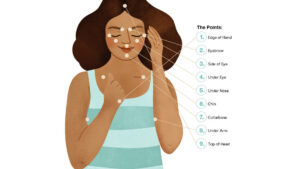Depression is a mental health disorder that affects millions of people each year. While there are many different treatments available, some people are looking for an alternative solution. Tapping therapy is a relatively new treatment that has been gaining popularity in recent years. Could tapping therapy be the solution for depression? Keep reading to find out!
Contents
- 1 What Is Tapping Therapy?
- 2 Does Tapping Work For Depression?
- 3 How Does Tapping Therapy For Depression Work?
- 4 What Are The Tapping Points For Depression?
- 5 How Do I Start Tapping For Depression?
- 6 What Benefits To Expect With Tapping Therapy For Depression?
- 7 How Long Does It Take For Tapping To Work?
- 8 Conclusion
What Is Tapping Therapy?
 Tapping therapy, also known as Emotional Freedom Technique (EFT) or “tapping”, is a method of healing based on the principles of acupuncture and applied kinesiology. This technique pairs light physical tapping with psychological affirmations to help release stored emotional trauma and negative beliefs from our subconscious minds.
Tapping therapy, also known as Emotional Freedom Technique (EFT) or “tapping”, is a method of healing based on the principles of acupuncture and applied kinesiology. This technique pairs light physical tapping with psychological affirmations to help release stored emotional trauma and negative beliefs from our subconscious minds.
Tapping can help to release blocks in our energy systems that can cause physical and emotional pain and discomfort. By releasing these blocks, we are able to move forward with more ease and clarity. It has been found to be an effective tool in treating a variety of conditions, from anxiety and depression to PTSD, phobias, chronic pain, stress, addictions, and more.
Does Tapping Work For Depression?
Depression is a serious condition that can affect many aspects of life, from your emotions and behavior to your physical health. Tapping, or EFT (Emotional Freedom Technique), is an alternative therapy that has been used to help people cope with depression. It involves tapping on specific acupressure points. While repeating positive affirmations in order to reduce stress and promote relaxation.
Studies have shown that EFT can be an effective treatment for depression. One study found that after six weeks of regular tapping sessions, participants reported a reduction in depressive symptoms such as sadness, hopelessness, and suicidal thoughts. They also experienced an increase in positive emotions such as joy and enthusiasm.
Other studies have also found evidence that EFT can be beneficial for people with depression. So, overall, there is some evidence that EFT may help to reduce symptoms of depression in some individuals. However, more research is needed to examine the long-term effects of this therapy.
How Does Tapping Therapy For Depression Work?
Tapping therapy is a form of psychotherapy or mind-body medicine combining cognitive behavior therapy (CBT) with exposure therapy. By engaging in tapping, you can rapidly reduce stress, anxiety, and other challenging emotions while re-framing your thoughts to create lasting change.
The premise behind tapping is that we are all made up of energy, and when that energy is blocked or disrupted it can cause us to experience negative emotions like stress, anxiety, depression, and fear. Tapping works by stimulating these energy points on the body through a gentle tapping motion with your fingertips while focusing on the issue at hand.
Tapping therapy helps to release the blocked energy associated with negative emotions, allowing the body to relax and release those emotions. This can help to reduce the intensity of painful memories or experiences that may be causing depression. Tapping also works by changing our thought patterns, which can lead to changed behavior and emotion.
What Are The Tapping Points For Depression?
The tapping points used for treating depression are located on the face and body. The following are some of the main tapping points used:
- On the Face – Eyebrow, Side of Eye, Under the Eye, Under Nose, Chin, Collarbone, Under Arm.
- On the Body – Top of Head (Crown), Side of Hand, Wrist, Thumb, Index Finger, Pinky Finger.
These tapping points can be used in combination to target different areas of emotional distress or physical discomfort that may be contributing to depression symptoms. By gently tapping on each point while focusing on the issue at hand, it helps to reduce stress and bring the body back into balance.
It also helps to release emotions, allowing us to connect with our true feelings and gain clarity and insight into what is really going on in our lives. This can help us to make more informed decisions about how we want to deal with our depression.
How Do I Start Tapping For Depression?
Tapping for depression is a simple, yet powerful tool that can help shift your mood and give you relief from depression symptoms. It involves tapping on specific points in the body while focusing on negative thoughts or feelings associated with depression.
To start tapping for depression, here are a few simple steps:
1. Identify the core emotion or feelings associated with your depression. This could be sadness, guilt, anxiety, anger, fear, or any other emotion that you are feeling.
2. Choose a phrase to focus on while tapping. You can use positive affirmations such as “I release this sadness” or “I am ready to let go of this fear.”
3. Start tapping on the points associated with depression relief. These include the side of your hand, eyebrow, side of your eye, under your eye, under your nose and chin, collarbone, and top of the head.
4. Breathe deeply, and focus on the phrase you have chosen. Visualize the emotion leaving your body with each tap.
5. Repeat the tapping sequence up to 10 times or until you feel a shift in your emotional state.
Tapping can be done anytime, anywhere, and is an excellent tool for managing depression symptoms without medication. With regular practice and patience, tapping for depression can be an effective tool for bringing relief. If you have any questions or need guidance in using tapping for depression, please reach out to a qualified therapist or professional for help.
What Benefits To Expect With Tapping Therapy For Depression?
The following are several benefits that you can expect to experience with tapping therapy for depression:
- Reduced Stress and Anxiety – Tapping is a natural way to reduce stress and anxiety levels quickly, allowing individuals to feel more relaxed and in control of their emotions.
- Enhanced Mood Regulation – By helping individuals regulate their emotions, this type of therapy can help them to better manage their moods.
- Improved Cognitive Functioning – Tapping has been shown to increase focus, improve concentration and help individuals think more clearly and logically.
- Increased Self-Esteem – Through tapping, individuals can gain a greater understanding of their own worth and self-esteem levels will naturally rise over time.
- Better Quality of Life – By learning to better manage their emotions, individuals can live a more fulfilled and meaningful life that is free from depression symptoms.
- Improved Physical Health – Since tapping helps reduce the stress hormone cortisol in the body, this therapy can also lead to physical health improvements like improved sleep, reduced fatigue, and an overall sense of well-being.
- Stronger Emotional Resilience – Tapping therapy can help individuals to become more emotionally resilient. That means they are better equipped to cope with difficult times and life’s challenges.
As you can see, there are many potential benefits that you can experience by engaging in tapping therapy for depression. This type of therapy is an effective and natural way to reduce symptoms, better regulate emotions, and improve the overall quality of life. If you’re looking for a safe, non-invasive approach to dealing with depression, then consider giving tapping therapy a try. With the help of a qualified therapist, you can begin to experience the benefits of this type of therapy in no time.
How Long Does It Take For Tapping To Work?
If you are choosing tapping therapy for depression, then you may be wondering how long it will take for the treatment to work. Well, the answer is largely dependent on your own personal circumstances and the severity of your depression. Some people may find that after just a few sessions they start to notice positive changes in their moods. While others may need more consistent and longer-term therapy before they see any improvement.
In general, tapping therapy is most effective when practiced consistently over long periods of time. It can also be helpful to use tapping in combination with other forms of therapy or lifestyle changes. Such as regular exercise, healthy eating habits, and stress reduction techniques.
One thing to keep in mind is that tapping therapy should not be seen as a replacement for medication or other traditional therapies. While it can be a helpful complement to more traditional treatments. But it is important to always speak with your doctor before beginning any new therapy or treatment plan.
Conclusion
In conclusion, tapping therapy for depression is often seen as a safe and effective form of psychological therapy. It is believed to work through the mind-body connection, activating certain neural pathways in the brain. Eventually, it can help alleviate symptoms of depression. Tapping helps individuals become more aware of their emotions and learn new ways to manage them. And that can improve mental health overall.
While there is still much research needed to understand exactly how tapping works, the current evidence suggests it may be beneficial for some people with depression.
For more information, please contact MantraCare. Depression is a mental illness characterized by persistent feelings of sadness, hopelessness, and loss of interest in daily activities. If you have any queries regarding Online Depression Counseling experienced therapists at MantraCare can help: Book a trial Depression Therapy session


